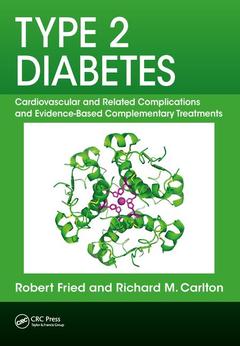Type 2 Diabetes Cardiovascular and Related Complications and Evidence-Based Complementary Treatments

Approximately 29 million Americans are diagnosed with Type 2 diabetes annually. Of that number, only about 36 percent (10.44 million diabetes sufferers) achieve satisfactory medical outcomes and would need additional help?rarely available?to reliably control their glucose levels. Contrary to popular belief, although anti-diabetic medications can lower sugar levels, nevertheless they have a poor performance track record because inflammation in the blood vessels persists.
This book details recent scientific findings that cardiovascular, kidney, vision, peripheral nervous system, and other body damage caused by chronic high levels of blood sugar (hyperglycemia) in Type 2 diabetes is actually due to excessive generation of unopposed free radicals and reactive oxygen species (ROS). These, in turn, cause chronic systemic inflammation and dysfunction of the endothelial lining of the arterial blood vessels, jeopardizing the formation of the protective molecule nitric oxide (NO), thus severely impairing the blood supply to every organ and tissue in the body. This book also catalogues the evidence that chronic hyperglycemia causes profound and often irreversible damage?even long before Type 2 diabetes has been diagnosed. In addition, because conventional prescription treatments are, unfortunately, often inadequate, the book details evidence-based complementary means of blood sugar control.
Chronic Hyperglycemia--A Primer. Hyperglycemia Impairs Blood Vessel Function. Cardiovascular and Related Complications of Diabetes. Hyperglycemia Impairs the Functions of Blood. Chronic Hyperglycemia Impairs Vision, Hearing, and Sensory Function. On the Importance of Monitoring Blood Sugar and Other "Vital Signs." Advanced Glycation End-Products--A Special Hazard in Diabetes. General Nutrition Considerations for Chronic Hyperglycemia--Type 2 Diabetes. Mode of Action of Selected Botanicals That Lower Blood Glucose. Selected Botanicals and Plant Products That Lower Blood Glucose (Continued). Selected Functional Foods That Combat the Effects of Hyperglycemia and Chronic Systemic Inflammation. Functional Foods Continued: White Mulberry (Morus Alba) Leaf Extract and Tea. Selected Supplements That Support Glycemic Control and Reduce Chronic Inflammation. Additional Supplements That Support Glycemic Control and Reduce Chronic Inflammation.
Dr. Robert Fried was born in Linz, Austria, immigrated to the United States, and served in the Signal Corps, US Army, supporting radio communications for the Korean Military Advisory Group (KMAG), Seoul, Korea. Following honorable discharge, he entered The City College of New York (CCNY) and then the graduate program at Rutgers University, New Brunswick, New Jersey, earning his PhD in physiological psychology. Dr. Fried was appointed to the faculty of Hunter College, City University of New York (CUNY), as well as the Doctoral Faculty in Behavioral Neuroscience at the City University of New York (CUNY). He is licensed in clinical psychology in New York State and served for 4 years as Director of the Rehabilitation Research Institute (RRI), International Center for the Disabled (ICD), New York, where he conducted and later published his research on the control of blood gases and blood pH in idiopathic seizure disorders. He was research scientist, Aviation Medical Acceleration Laboratory (Project Mercury); research associate, Eastern Pennsylvania Psychiatric Institute (EPPI), Temple University Medical School, and adjunct assistant professor, The University of Pennsylvania, both in Philadelphia; research psychologist, Atascadero State Hospital for the Criminally Insane Sex Offender, Pasa Robles, California, and visiting professor, California Polytechnic State University, San Luis Obispo; research associate, Department of Community Health, Albert Einstein College of Medicine; and research associate, Payne Whitney Clinic, Cornell University Medical School. He retired from CUNY in 2010 as Professor Emeritus. Dr. Fried has lectured extensively in the United States and abroad and has conducted numerous workshops on respiratory and cardiovascular psychophysiology and blood gas self-regulation in neurological disorders, cardiovascular function, and stress syndrome. He holds a number of US patents in biomedical instrumentation including one of the earliest
Date de parution : 10-2018
17.8x25.4 cm
Disponible chez l'éditeur (délai d'approvisionnement : 14 jours).
Prix indicatif 144,74 €
Ajouter au panierDate de parution : 10-2018
17.8x25.4 cm
Disponible chez l'éditeur (délai d'approvisionnement : 14 jours).
Prix indicatif 271,33 €
Ajouter au panierThèmes de Type 2 Diabetes :
Mots-clés :
Aldose Reductase; integrative medicine/integrative treatment; Endothelial Dysfunction; diabetes + nutrition/botanicals/plan products/functional foods; Corneal Resistance Factor; glucose metabolism + heart; Nonproliferative Diabetic Retinopathy; chronic hyperglycemia; coronary heart disease; QUICKI; chronic inflammation; Insulin Resistance; Richard M; Carlton; Vasa Vasorum; reactive oxygen species; Bitter Melon; chronic hyperglycemia; Potentiate Glucose Induced Insulin Secretion; botanical applications; Thyroid Function; Type 2 diabetes; Safflower Seed; unopposed free radicals; Endothelial Function; RBC Aggregation; Low Age Diet; Thyroid Dysfunction; FSFI Score; Mediterranean Diet; Mulberry Leaf; Increase Platelet Reactivity; Corneal Hysteresis; Intraepidermal Nerve Fiber Density; Corneal Endothelial Cell Density; CVD Event; Taurine Supplementation; Omega-3 Fatty Acids



